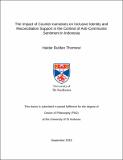Files in this item
The impact of counter-narratives on inclusive identity and reconciliation support in the context of anti-communist sentiment in Indonesia
Item metadata
| dc.contributor.advisor | Tausch, Nicole | |
| dc.contributor.author | Thontowi, Haidar | |
| dc.coverage.spatial | 238, [4] p. | en_US |
| dc.date.accessioned | 2021-02-22T16:03:27Z | |
| dc.date.available | 2021-02-22T16:03:27Z | |
| dc.date.issued | 2020-12-01 | |
| dc.identifier.uri | https://hdl.handle.net/10023/21478 | |
| dc.description.abstract | Psychologists have argued that counter-narratives play an important role in reconciliation processes. However, limited experimental evidence exists to explain the conditions of when counter-narratives are most effective. This thesis attempts to fill this gap in the literature in the context of Indonesia’s past persecution of communists. Using insights from the political solidarity model (Subasic et al., 2008) and the theory of inclusive victimhood consciousness (Vollhardt, 2013) s a framework, I argue that co-victimization counter-narratives would be more effective in promoting reconciliation. In addition, I reason that a co-victimization counter-narrative would affect reconciliation by increasing participants’ sense of inclusive identity with ex-communists. Accordingly, I conducted four online experiments collecting data from a total of 1,620 Indonesian participants. In study 1, I found that the co-victimization counter-narrative was more effective in promoting reconciliation compared to the control group and that its effect on reconciliation was mediated by inclusive identity. In study 2, I identified political Islam as moderating the influence of the counter-narratives on inclusive identity such that the co-victimization counter-narrative was not effective among participants who highly endorsed political Islam. Study 3 attempted to use norms as a way to increase the strength of the counter-narrative. I found that, as expected, a group relevant norm manipulation showed no additive effect on co-victimization. However, through exploratory analysis, I also found that pairing the counter-narratives with the norm manipulations had significant effects depending on political Islam endorsement levels and perceived descriptive and injunctive norms. Study 4 explored the role of threat in affecting resistance to counter-narratives. The main finding was that manipulations of low threat allowed the counter-narrative to affect inclusive identity among participants who reported low endorsement of political Islam while manipulations of high threat produced an effect of the counter-narrative on inclusive identity among participants who reported high endorsement of political Islam. | en_US |
| dc.language.iso | en | en_US |
| dc.publisher | University of St Andrews | |
| dc.rights | Creative Commons Attribution-NonCommercial-NoDerivatives 4.0 International | * |
| dc.rights.uri | http://creativecommons.org/licenses/by-nc-nd/4.0/ | * |
| dc.subject | Counter-narrative | en_US |
| dc.subject | Reconciliation | en_US |
| dc.subject | Inclusive identity | en_US |
| dc.subject | Communists | en_US |
| dc.subject.lcc | HM1126.T5 | |
| dc.subject.lcsh | Conflict management--Indonesia | en |
| dc.subject.lcsh | Reconciliation--Social aspects--Indonesia | en |
| dc.subject.lcsh | Intergroup relations--Indonesia | en |
| dc.subject.lcsh | Communism--Indonesia--History--20th century | en |
| dc.subject.lcsh | Discourse analysis, Narrative | en |
| dc.subject.lcsh | Social psychology | en |
| dc.subject.lcsh | Indonesia--History--Coup d'état, 1965 | en |
| dc.title | The impact of counter-narratives on inclusive identity and reconciliation support in the context of anti-communist sentiment in Indonesia | en_US |
| dc.type | Thesis | en_US |
| dc.contributor.sponsor | Indonesian Endowment Fund for Education | en_US |
| dc.type.qualificationlevel | Doctoral | en_US |
| dc.type.qualificationname | PhD Doctor of Philosophy | en_US |
| dc.publisher.institution | The University of St Andrews | en_US |
| dc.identifier.doi | https://doi.org/10.17630/sta/29 |
The following licence files are associated with this item:
This item appears in the following Collection(s)
Except where otherwise noted within the work, this item's licence for re-use is described as Creative Commons Attribution-NonCommercial-NoDerivatives 4.0 International
Items in the St Andrews Research Repository are protected by copyright, with all rights reserved, unless otherwise indicated.


